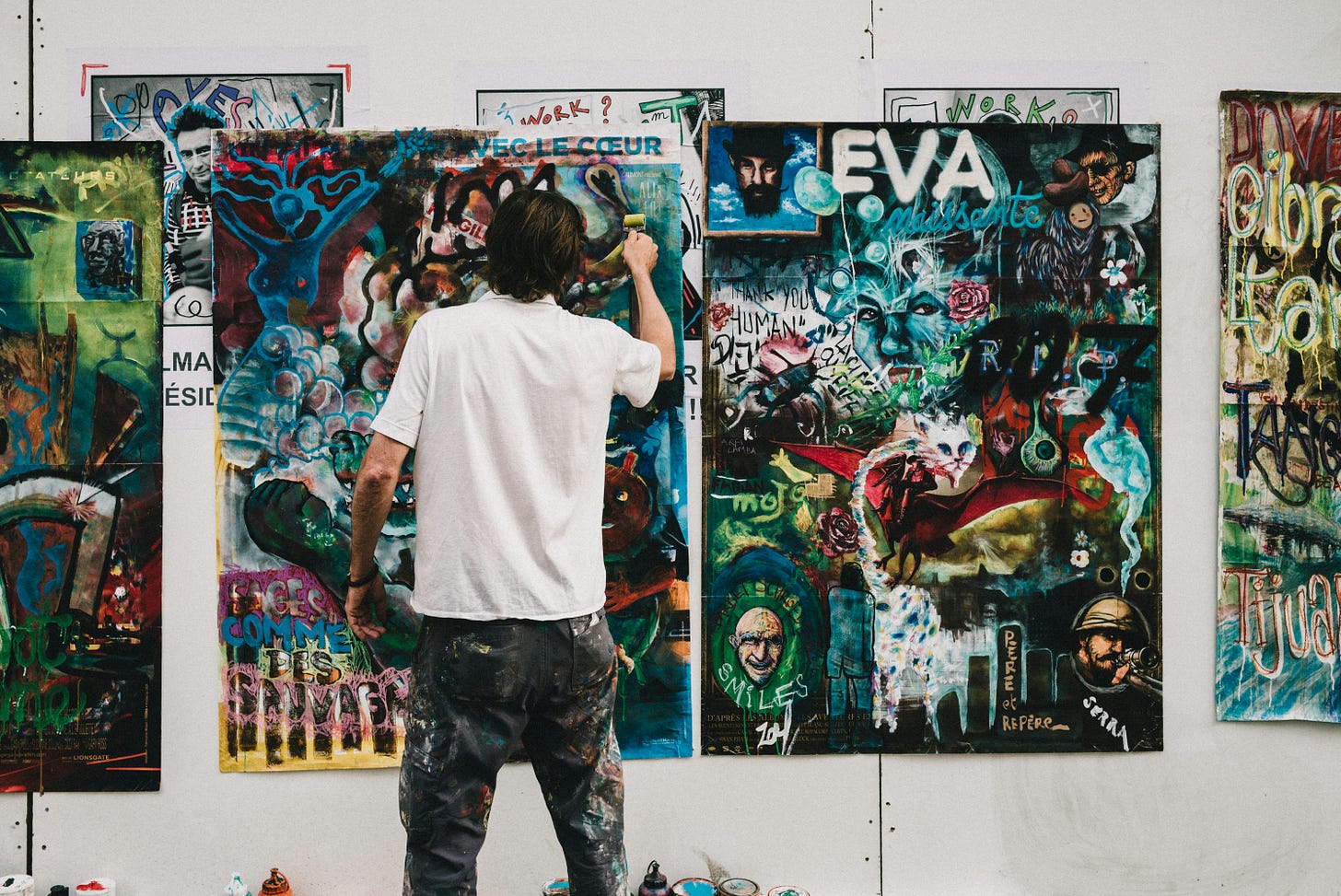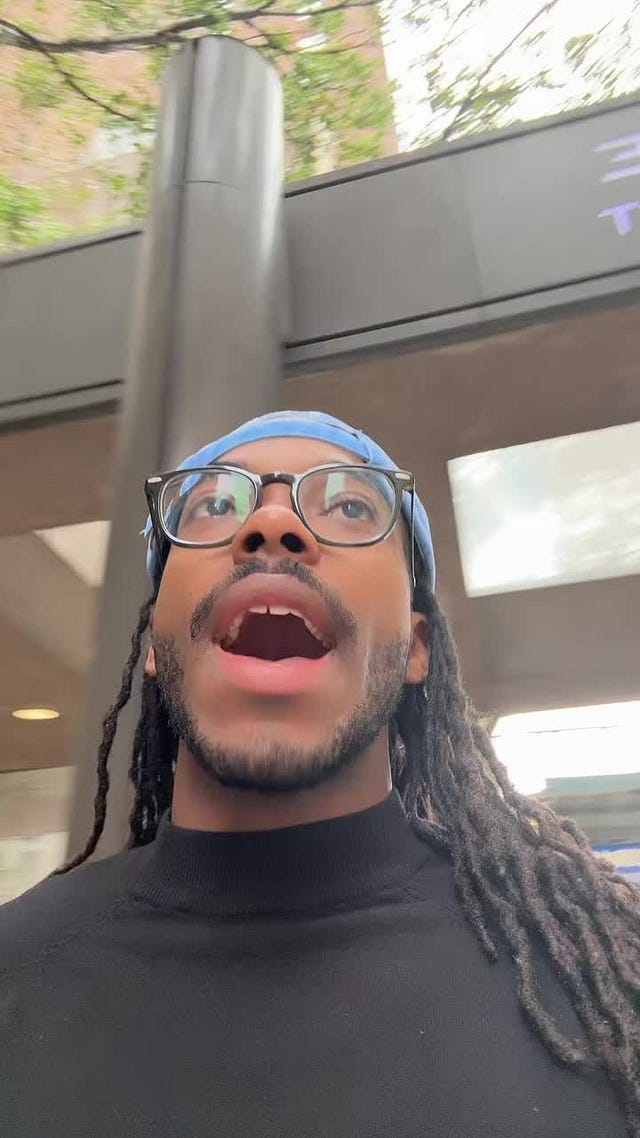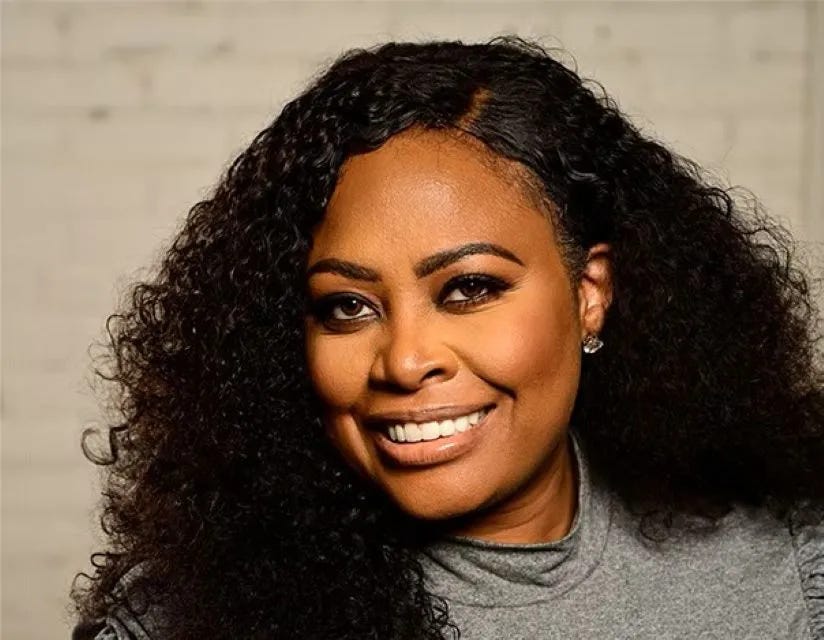Creating Through Uncertainty: How Emerging Artists Are Navigating an Unstable Economy
Amid the government shutdown, trade tensions, and DEI rollbacks, young creatives are finding ways to sustain their work, innovate, and build long-term careers.
As impacts from the government shutdown and the ongoing trade war continue, the arts and creative industry faces mounting challenges amid backlash against policies promoting diversity, equity, and inclusion (DEI) throughout the 2020s. The sector contributes more than $1.1 trillion to the economy.
“At their best, diversity programs should remind us that everyone deserves to be treated equally and with respect, no matter who they are,” said author and psychotherapist Jonathan Alpert in a previous report from The Introspective.
“Unfortunately, the trend over the last few years across so many American institutions has been to make DEI programs into political commissars, to go after people with different viewpoints, and they end up, in many ways, sowing more division in the institutions they’re supposed to help.”
The Smithsonian Institution was previously ordered by the White House to review exhibits that aligned with President Trump’s directive to “reflect the unity, progress, and enduring values that define the American story,” affecting major museums across Washington, D.C.
Economic uncertainty is also reshaping work habits, a previous Introspective report found that Gen Z is moving away from conventional 9-to-5 jobs: 72% have a “side hustle,” many earning between $500 and $1,000 a month, and 1 in 5 said “working to live” is preferable to “living to work.”
“They don’t want to wait to climb the corporate ladder or be recognized as ‘thought leaders’ in their industries to make a positive, measurable impact through their careers,” said Ann Woo, the former head of corporate citizenship at Samsung Electronics America.
“If you have all of the tools to put your voice out in the world and pursue your dreams, why delay?”
At the same time, companies have announced more than 1.1 million layoffs this year—the highest since the Great Recession—with 153,074 job cuts in October alone, according to a previous Introspective report.
Emerging Creatives
The Introspective spoke with Simone Clarke, the executive director of New York City–based MEFeater ImpactHub, a nonprofit aimed at investing in young creatives from marginalized communities, about how leaders are supporting artists through media, marketing, PR, digital content, and event production.
“Entrepreneurship is the heartbeat of the next generation of media,” said Clarke.
“Young creatives aren’t waiting for permission anymore—they’re building brands, producing content, and creating platforms that reflect their voices and communities,” she added.
“We’re building a sustainable ecosystem, not just internships or short-term programs, but long-term pipelines that connect talent to opportunity.”
The increased support comes as studies have shown that unemployment among young college graduates has been higher than average, with additional research from LinkedIn finding that entry-level job postings in tech, finance, and consulting dropped more than 18% over the past year.
Simone sees Gen Z entering freelance work as “young creatives answering that call” as media becomes more decentralized and creator-driven.
“We’re not just preparing students for jobs that exist today—we’re preparing them to create what comes next,” she said.
“Organizations like MEFeater ImpactHub will play a vital role in shaping the future by cultivating the next wave of storytellers, producers, and strategists who understand culture and community.”
A study from Upwork found that 64 million Americans—38% of the U.S. workforce—went into freelance work in 2023, with 52% of Gen Z freelancing, compared to 44% of Millennials, 30% of Gen X, and 26% of Baby Boomers.
DEI, Mentorship, and Experience
As backlash to DEI continues, many organizations have laid off departments dedicated to covering Black, Asian, Latino, and LGBTQ+ communities.
“I just got laid off from my job at CBS, and every producer on my team who got laid off is a person of color,” alleged former CBS News employee Trey Sherman in a TikTok post, saying that “every person who gets to stay and will be relocated within the company is a White person.”
“It wasn’t until I went downstairs thinking that me and all of my colleagues had been laid off that I found out that it was only the people of color,” he continued.
“So, I went one by one to my White colleagues. ‘Are you getting laid off?’ ‘No.’ ‘Are you getting laid off?’ ‘No.’ ‘Are you getting laid off?’ ‘No.’ ‘Are you getting laid off?’ ‘No.’”
Sherman, who worked as an associate producer for the series CBS Evening News+, accused an executive at CBS of lying about helping to keep all laid-off employees at the company.
“So, I went back up to his office, and I told him I think he lied to my face,” he said.
“And come to find out it was not his decision to eliminate the show that I worked for, but he did get to decide who got to stay. … So I told him, ‘You said that you couldn’t get us relocated, only to find out that you were able to get some people relocated, and they all happen to be White. Am I supposed to believe that that’s a coincidence?’ And he said yes.”
Sherman later alleged that the executive told him he kept employees that he “worked with before,” prompting Sherman to call the layoffs racist.
“I don’t care if you decided to keep people who have purple-colored hair,” said Sherman.
“You decided to keep people who you had worked with before—with—don’t even know if that’s true—if the outcome of that decision is racist, the action was racist. That shit is fucked,” he added.
 Tiktok failed to load.
Tiktok failed to load.Enable 3rd party cookies or use another browser
This also comes as NBC News shut down departments such as NBC BLK, NBC Asian America, NBC Latino, and NBC OUT, leaving the company with no dedicated sectors for Black Americans, Asian and Latino Americans, or LGBTQ+ people.
When asked by The Introspective how MEFeater ImpactHub is preparing young creatives for a post-DEI America, Simone Clarke sees the moment as a call to “lead with purpose” and to ensure that “creativity continues to be a space where everyone can belong and succeed.”
“While many companies are scaling back their DEI initiatives, our mission remains steadfast: to invest directly in young creatives from underrepresented communities and give them the tools, access, and confidence to thrive,” she said.
“We’re building a sustainable ecosystem—not just internships or short-term programs, but long-term pipelines that connect talent to opportunity.”
Clarke also emphasized MEFeater ImpactHub’s paid opportunities for creatives, including internships, site visits, client work, and seasonal drives.
“Every intern at MEFeater ImpactHub is paid to learn, create, and grow through hands-on experiences with real clients and community partners,” she said, adding that the experiences build networking skills and give creatives a sense of purpose.
“That financial support matters, especially for families navigating economic uncertainty.”
Local Impacts
The Introspective also spoke with Robyn Murphy, chief executive officer of the Baltimore Office of Promotion & the Arts (BOPA), also known as Create Baltimore, to see how local organizations are supporting creatives as the trade war continues.
When asked how Baltimore’s artists are adapting to the ongoing uncertainty, Murphy said she is seeing a “real spirit” take hold.
“This period of uncertainty is pushing Baltimore’s creative community to become even more connected, innovative, and resilient,” she said.
“Artists and organizations are sharing resources, co-producing events, and finding ways to avoid duplicating efforts,” she added.
“There’s also been a noticeable shift toward creative problem-solving—exploring alternative funding models, cross-sector partnerships, and community-based initiatives that make the most of limited resources.”
A report from the Baltimore Banner noted that reduced federal funding has left many creative communities in the city determined to continue emphasizing diversity, despite the ongoing backlash to DEI.
“We are known for our diversity—even before it became a title or a thing,” said Jason Steer, executive director of Patterson Park’s Creative Alliance, in the report, criticizing the backlash.
“Art is going to be a wonderful place where we push against that,” he continued.
“It’s a place where we learn about each other.”
When asked by The Introspective about the impacts on individual artists, Murphy emphasized the added stress faced by the working class.
“Rising costs—from materials to healthcare to general living expenses—have put additional strain on working artists, many of whom don’t have access to employer-based benefits,” she said, emphasizing how the organization is also focused on maximizing current resources, building sustainability, and developing partnerships.
“Artists and organizations are already breaking down silos, sharing resources, and moving away from gatekeeping toward a more open, interconnected arts ecosystem,” she continued.
“Baltimore’s creative community has always been known for its grit and innovation. Those same qualities will continue to drive new forms of expression, more equitable opportunities, and a cultural landscape that reflects the unique vibrancy of the city itself.”







